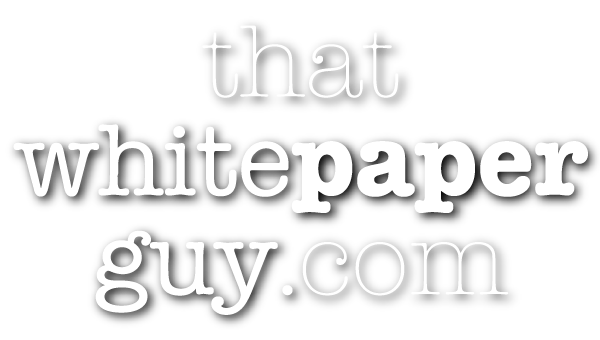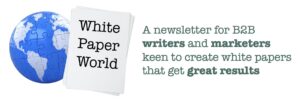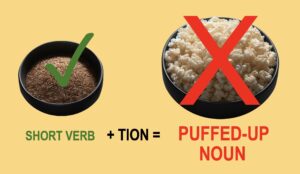White Paper World 28: September 14, 2023
- This just in: My latest article on AI for writers
- Quick tip: Do your own interviews
- Pet peeve: Tweets pasted in articles
- AI Survey Book Giveaway: Another winner!
- Big Idea: AI should pay residuals

Graphic from DALL-E2. Prompt: Three writers walk into a bar, late afternoon golden sunshine.
This just in: My latest article on AI for writers
Three writers walk into a bar: one loves AI, one hates AI, and one tolerates AI.
The bartender says, “You guys spend more time debating AI than writing! Are you here for drinks or a Turing test?”
Or maybe he says, “Let me guess, you want one glass half-full, another glass half-empty, and a third glass that’s an AI hallucination?”
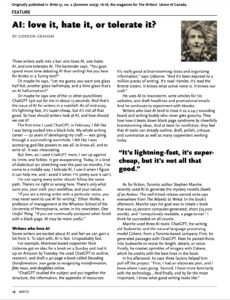 Or maybe he says one of the 10 other punchlines ChatGPT spit out for me in about 15 seconds.
Or maybe he says one of the 10 other punchlines ChatGPT spit out for me in about 15 seconds.
And that’s the issue of AI for writers in a nutshell:
As of mid-2023, it’s lightning-fast, it’s super-cheap, but it’s not all that good.
So how should writers look at AI, and how should we use it?
Click here to see the rest of my article on AI for writers from the August issue of Write, the magazine of The Writers Union of Canada.

Quick tip: Do your own interviews
What’s the very best way to get great insights and quotes from experts?
Interview them yourself.
When you speak firsthand to a source, you often get great “sound bites.” And those can add an engaging human touch to your content.
Plus, you get a chance to ask questions on anything you don’t quite understand.
And you can get a comment that’s directly on-topic.
Most interviews today are done by Zoom, so you can watch your subject’s face for any subtext.
And that can pay off in great insights from a real, engaged conversation with another person.
That’s something AI can’t do. So that’s one more way to make your writing AI-proof.
How do you find experts and get them to talk?
In an earlier Quick Tip, I suggested that you build your own set of experts who will make time for you.

One starting point I didn’t list in that tip: LinkedIn. That’s an ideal place to find experts in your space.
Anyone active on social media is clearly trying to build their platform. Being interviewed and quoted is an excellent way to do so.
So if you link to someone, follow them for some time, react to their posts, and then ask for an interview, the odds of them saying “Yes” go way up.
Direct quotes are far more persuasive
Speaking directly to a source gets you a far better quote, and provides far more context than a snippet from social media.
So plan on doing live interviews with sources outside your company for your next white paper. It will add life and sparkle to your piece.
If you haven’t done many interviews before, you can learn.
See my tips on interviewing executives and how to avoid asking dumb questions.
And remember: Don’t take shortcuts. Go right to the source.
And, on that note…
Pet Peeve: Tweets pasted into articles
One of my pet peeves is when a journalist or blogger takes a shortcut by pasting someone’s Tweet right into their article, as shown below.

Pet peeve: Lazy writers who paste in tweets
Perhaps publishers are loading too much work onto writers. Perhaps writers no longer distinguish a social media interaction from real discussion…
But to me, this is the height of laziness.
And, with the dawning of AI, how will we know whether real, flesh and blood people are generating these Tweets?
I’d like to see this banned from all respectable publications and websites.
Couldn’t the writer pick up the phone?
Or at least email one person to add more depth and value to that quote?
Sure, sure, they didn’t have time.
They didn’t have the person’s phone number.
They didn’t have their email.
Excuses, excuses.
When I was starting out in journalism many years ago, my editor had an expression I never forgot: “The paper can’t print excuses.”
Of course, you would never do this in a white paper.
So please don’t do it anywhere else.
AI Survey Book Giveaway: Another winner!
A grand total of 333 writers took my AI for Writers Survey, and I’m analyzing the results now. Watch for my report in the next issue.
Respondent #333 is my latest book winner: Nicole Bergstrom.
Originally from Egypt, Nicole came to the U.S. as a child. She earned an MA in English and film from Northwestern University in Chicago.
Then she made TV commercials. With director Joe Sedelmaier, famous for the “Where’s the Beef?” campaign for Wendy’s, Nicole did everything from casting to finding props.
“You name it, I did it,” she says.
Next she ran a production company with her husband Erick Bergstrom for more than 20 years.
You can see one of the tongue-in-cheek commercials directed by Erick here: https://vimeo.com/69162427/e3a38b863d
That ad still works and gives me a chuckle!
More recently, Nicole relocated to Baltimore close to Johns Hopkins where Erick took a job in marketing.
After caring for her mother for some time, Nicole went back to her first love, writing. These days, she’s keen to explore the integration of eastern and western medicine.
So, what would her favorite new project look like?
“A holistic health clinic asks me to write a Landing Page to introduce new clients to their clinic and describe their unique approach,” she says.
“And then they ask me to write Case Studies… all the while demonstrating the transformational power of holistic treatments!”
That’s a clear vision, Nicole, and I hope your phone rings off the hook with clients just like that.
For her prize, Nicole picked a signed copy of my book, White Papers For Dummies.
And even though my AI survey is over, I think I’ll keep on giving away books. It’s really fun! Plus, it gives me a great excuse to meet fellow writers.
Big Idea: AI should pay residuals
On the survey, Nicole scored 60% AI Pragmatist and 40% AI Enthusiast. She uses AI to generate lots of ideas to sift through.
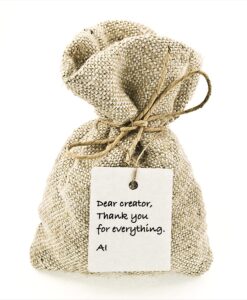 But she’s critical of how AI is being rolled out by Big Tech firms.
But she’s critical of how AI is being rolled out by Big Tech firms.
In fact, she just drafted a five-page document called, “Ruminations on Writing a Constitution of Being Human.”
“It’s time we stood up and defined ourselves as creative beings,” she says.
“Our creative work is being used by AI companies, and we should be paid for it.”
In the landscape of AI, we declare these truths to be self-evident:
- Human beings are creative and we are curious
- We are sentient and create with language and with the Self (image, voice)
- We have the right to make a living as curious and creative creatures
- Our works are not in the public domain unless we expressly put them there
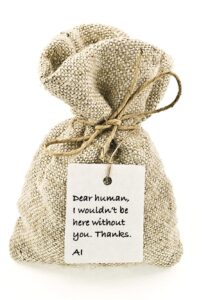 “Should we allow the indiscriminate use of our voice and image, our language, our creations?” she adds.
“Should we allow the indiscriminate use of our voice and image, our language, our creations?” she adds.
“Are we just rich fertile soil that AI the Worm continues to burrow in and regurgitate anew at someone’s prompting?”
Writers and actors and studios shouldn’t be on strike against each other, she says.
“The studios, writers, actors, artists, extras, and everyone else should get together and tell the AI companies they can’t use our work without paying us residuals!” she says.
Residuals are ongoing payments that flow to creators as their work is reused over time.
These days, streaming companies want to cut back on residuals. That’s a sore point between studios and writers and actors.
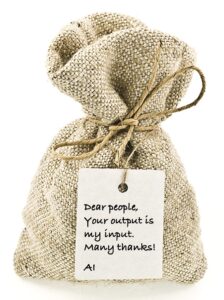 Instead, Nicole proposes expanding residuals to cover everything created by human ingenuity, and getting AI firms to pay them.
Instead, Nicole proposes expanding residuals to cover everything created by human ingenuity, and getting AI firms to pay them.
She counts “all the materials created, owned, and curated by our news-gathering media, our libraries, our museums… all the data created by humans that AI is using as its database.”
OpenAI, which owns ChatGPT with Microsoft, is now expected to generate $1 billion in revenue over the next 12 months.
Yet to train their models, AI companies grab content wherever they can.
For example, some AI companies used illegal scans of 170,000+ books from pirate websites. This intriguing article from The Atlantic gives all the details.
The point is that any professionally written book gives the AI companies a better writing sample than anything they can find on Reddit or Twitter.
Humans are the silkworms, says Nicole. And without that thread of human creativity pulled out of us, AI can’t weave its wondrous results.
So why shouldn’t Big Tech companies share the wealth? Why shouldn’t they pay humans ongoing residuals?
Now that’s a Big Idea I hope goes somewhere.
That’s all for this issue
Welcome back to school, back to work.
You can see all the previous issues of White Paper World here:
www.thatwhitepaperguy.com/newsletters/
And to see every future issue, make sure to subscribe here:
www.thatwhitepaperguy.com/subscribe/

Gordon Graham
That White Paper Guy
